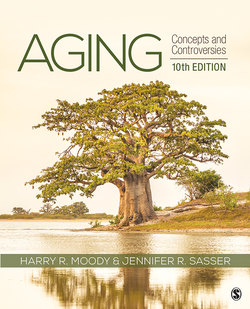Читать книгу Aging - Harry R. Moody - Страница 13
На сайте Литреса книга снята с продажи.
Learning Objectives
ОглавлениеAfter reading Basic Concepts I, readers will:
1 Understand aging as a lifelong experience that is multifaceted and shaped by the contexts in which individuals live.
2 Be familiar with the central theories developed to understand and explain aging.
3 Identify the main biological processes thought to regulate aging.
4 Appreciate the ways in which social construction and historical factors influence our understandings of age, aging, and later life.
When we think about “aging,” we often call to mind the image of an old person. But the process of aging actually begins much earlier in life. We cannot fully understand what old age means unless we understand it as part of the entire course of human life, and this approach is called the life course perspective (Fuller-Iglesias, Smith, & Antonucci, 2009; Settersten, 2003).
Often our image of old age is misleading. For example, try to conjure a mental image of a college student. Now imagine a recent retiree, a grandmother, and a first-time father. Hold those images in mind and then consider the following facts:
The majority of college students are adults, not traditional-age students right out of high school.
Retirees from the military are typically in their 40s or 50s.
In some inner-city neighborhoods, it is not at all unusual to meet a 35-year-old grandmother whose daughter is a pregnant teenager.
It is no longer surprising for men in second marriages to become fathers for the first time at age 40 or 50.
Did some of those facts contradict the images you conjured, particularly images related to the ages people are when they fill certain roles? What this exercise tells us is that roles such as “student,” “retiree,” “grandmother,” and “first-time father” are no longer necessarily linked to a certain chronological age or life course stage. Today, what we are learning about aging is forcing us to reexamine traditional ideas about adult development and what it means to grow old. Both findings from biomedical science and social behavior among older adults challenge stereotypical images of what is “right” or “appropriate” for a specific age.
Although we tend to think of old age as a stage at the end of life, we recognize that it is shaped by a lifetime of experience. Conditions of living, such as social class, formal education, and occupation, are determinants of the individual’s experiences in old age. In other words, the last stage of life is the result of all the stages that come before it. The implication is that we no longer accept the quality of life in old age, or even the meaning of old age, as a matter of destiny. Rather, we view it as a matter of individual choice and social policy. Whether older people feel satisfaction and meaning may therefore depend on what they do and how social institutions support them in finding new purpose in later life (Kohli, 2007).
Recent biological research demonstrates that indeed people do not suddenly become old at the time we have defined as old age. Aging is a gradual process, and many human capabilities survive long past the time when persons living in North America are considered of an age to retire. We are learning more every day about how and why people grow old, with the hope that we can make the last stage of life just as meaningful in its own way as earlier stages are.
